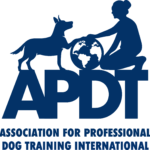APDT International
Standards of Practice
APDT International takes the stance that there are no training or behavior cases which justify the use of intentional aversive punishment-based interventions in any form of training ranging from general obedience and tricks to dealing with severe behavior problems. This is in alignment with the American Veterinary Society for Animal Behavior’s position statement and has been reinforced by available published research and literature. The use of aversive tools such as choke collars, prong collars, shock collars (including “stim-collars” and “e-collars”), bonkers, shaker-cans, citronella spray, water spray, leash-pop/leash-corrections (with any type of collar/harness), yelling, or any other technique designed to intentionally cause fear, pain, or startle in the dog, are not practices that fall within APDT Standards or our core values as an organization. All Members agree to abide by APDT Standards in the practice of training and behavior consultation for as long as their membership remains active.
APDT International
Standards of Practice
APDT International takes the stance that there are no training or behavior cases which justify the use of intentional aversive punishment-based interventions in any form of training ranging from general obedience and tricks to dealing with severe behavior problems. This is in alignment with the American Veterinary Society for Animal Behavior’s position statement and has been reinforced by available published research and literature. The use of aversive tools such as choke collars, prong collars, shock collars (including “stim-collars” and “e-collars”), bonkers, shaker-cans, citronella spray, water spray, leash-pop/leash-corrections (with any type of collar/harness), yelling, or any other technique designed to intentionally cause fear, pain, or startle in the dog, are not practices that fall within APDT Standards or our core values as an organization. All Members agree to abide by APDT Standards in the practice of training and behavior consultation for as long as their membership remains active.

APDT International
Standards of Practice
APDT International takes the stance that there are no training or behavior cases which justify the use of intentional aversive punishment-based interventions in any form of training ranging from general obedience and tricks to dealing with severe behavior problems. This is in alignment with the American Veterinary Society for Animal Behavior’s position statement and has been reinforced by available published research and literature. The use of aversive tools such as choke collars, prong collars, shock collars (including “stim-collars” and “e-collars”), bonkers, shaker-cans, citronella spray, water spray, leash-pop/leash-corrections (with any type of collar/harness), yelling, or any other technique designed to intentionally cause fear, pain, or startle in the dog, are not practices that fall within APDT Standards or our core values as an organization. All Members agree to abide by APDT Standards in the practice of training and behavior consultation for as long as their membership remains active.

APDT International
Standards of Practice
APDT International takes the stance that there are no training or behavior cases which justify the use of intentional aversive punishment-based interventions in any form of training ranging from general obedience and tricks to dealing with severe behavior problems. This is in alignment with the American Veterinary Society for Animal Behavior’s position statement and has been reinforced by available published research and literature. The use of aversive tools such as choke collars, prong collars, shock collars (including “stim-collars” and “e-collars”), bonkers, shaker-cans, citronella spray, water spray, leash-pop/leash-corrections (with any type of collar/harness), yelling, or any other technique designed to intentionally cause fear, pain, or startle in the dog, are not practices that fall within APDT Standards or our core values as an organization. All Members agree to abide by APDT Standards in the practice of training and behavior consultation for as long as their membership remains active.

One of the pillars of APDT International is the continuous development in our community as a safe space for exploration and conversation. Especially when there is a difference of perspective, the need for continued curiosity, mutual respect, and active listening are critical in advancing the profession to its fullest potential. We hold a zero-tolerance policy for abuse of others, verbal or otherwise, online and in person. APDT International invites all perspectives to connect within our community and provides opportunity for continued connection. By design, these opportunities to connect provide an open door for those who aspire to learn more how they may explore more of the organization and their profession in alignment with the Standards of Practice.
Position statement on humane dog training … – vet.osu.edu. (n.d.). Retrieved from
https://avsab.org/resources/position-statements/
Trainers who are unable to train a specific behavior or to a specific outcome without resorting to aversive techniques, may use APDT International’s resources to learn more or contact and work with trainers who can help.
One of the pillars of APDT International is the continuous development in our community as a safe space for exploration and conversation. Especially when there is a difference of perspective, the need for continued curiosity, mutual respect, and active listening are critical in advancing the profession to its fullest potential. We hold a zero-tolerance policy for abuse of others, verbal or otherwise, online and in person. APDT International invites all perspectives to connect within our community and provides opportunity for continued connection. By design, these opportunities to connect provide an open door for those who aspire to learn more how they may explore more of the organization and their profession in alignment with the Standards of Practice.
Position statement on humane dog training … – vet.osu.edu. (n.d.). Retrieved from
https://avsab.org/resources/position-statements/
Trainers who are unable to train a specific behavior or to a specific outcome without resorting to aversive techniques, may use APDT International’s resources to learn more or contact and work with trainers who can help.
One of the pillars of APDT International is the continuous development in our community as a safe space for exploration and conversation. Especially when there is a difference of perspective, the need for continued curiosity, mutual respect, and active listening are critical in advancing the profession to its fullest potential. We hold a zero-tolerance policy for abuse of others, verbal or otherwise, online and in person. APDT International invites all perspectives to connect within our community and provides opportunity for continued connection. By design, these opportunities to connect provide an open door for those who aspire to learn more how they may explore more of the organization and their profession in alignment with the Standards of Practice.
Position statement on humane dog training … – vet.osu.edu. (n.d.). Retrieved from
https://avsab.org/resources/position-statements/
Trainers who are unable to train a specific behavior or to a specific outcome without resorting to aversive techniques, may use APDT International’s resources to learn more or contact and work with trainers who can help.
Standards of Practice
Amended June 14, 2023
The Standards of Practice provide a framework of principles to convey a collective principle of professionalism, skills and values in positive reinforcement-based training. Each Member will be accountable to the following:
- Understand and promote training and behavior work within APDT Standards.
- Ensure learner success through a consistent, systematic approach that identifies a specific target behavior, the purpose of that behavior, and the consequences that maintains the behavior.
- Prevent the abuse and potential repercussions of inappropriate, poorly applied, and inhumane uses of punishment and of restrictive management and confinement strategies
- Does not employ the use of aversive tools such as choke collars, prong collars, shock collars (including “stim-collars” and “e-collars”), bonkers, shaker-cans, citronella spray, water spray, leash-pop/leash-corrections (with any type of collar/harness), yelling, or any other technique designed to intentionally cause fear, pain, or startle in the dog
- Continue professional development by reading relevant material; attending conferences, workshops and seminars; and pursuing other educational opportunities.
- Review and understand source material and academic texts for information.
- Abstain from representing training and behavioral information as scientific, unless the information is derived from peer-reviewed and published research.
- Refrain from offering guarantees regarding the outcome of training and behavior work.
- Provide services honestly
- Treat all animals and clients respectfully
- Value and preserve the privacy of clients
Standards of Practice
Amended June 14, 2023
The Standards of Practice provide a framework of principles to convey a collective principle of professionalism, skills and values in positive reinforcement-based training. Each Member will be accountable to the following:
- Understand and promote training and behavior work within APDT Standards.
- Ensure learner success through a consistent, systematic approach that identifies a specific target behavior, the purpose of that behavior, and the consequences that maintains the behavior.
- Prevent the abuse and potential repercussions of inappropriate, poorly applied, and inhumane uses of punishment and of restrictive management and confinement strategies
- Does not employ the use of aversive tools such as choke collars, prong collars, shock collars (including “stim-collars” and “e-collars”), bonkers, shaker-cans, citronella spray, water spray, leash-pop/leash-corrections (with any type of collar/harness), yelling, or any other technique designed to intentionally cause fear, pain, or startle in the dog
- Continue professional development by reading relevant material; attending conferences, workshops and seminars; and pursuing other educational opportunities.
- Review and understand source material and academic texts for information.
- Abstain from representing training and behavioral information as scientific, unless the information is derived from peer-reviewed and published research.
- Refrain from offering guarantees regarding the outcome of training and behavior work.
- Provide services honestly
- Treat all animals and clients respectfully
- Value and preserve the privacy of clients



